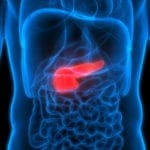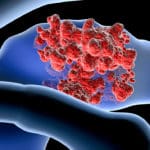Type: Pancreatic cancer

Improving the precision of this novel radiation technology could present a new treatment strategy for the 1,200 Australians diagnosed with locally advanced pancreatic cancer each year.
Professor Turner’s team aims to use cutting edge imaging approaches to shed light on how changes in nutrient metabolism and intracellular signalling contribute to two lethal characteristics of pancreatic cancer, namely chemoresistance and metastatic spread.
The team has developed a methodology to map the fibrotic tumour landscape, through real-time imaging of (i) the proximity of cancer cells to the host blood supply, (ii) their location with regards to the tumour invasive borders and (iii) the surrounding tissue compartment.
Associate Professor Marina Pajic and her team have identified a molecular pathway that controls communication between pancreatic cancer cells and stromal cells.

A/Prof Griffin will conduct pre-clinical tests of a much needed new combination treatment for patients with advanced pancreatic and bowel cancers.

Researchers will use cutting-edge imaging technology and lab models that mimic pancreatic cancer and watch tumour response to treatment.

Researchers will test a dual treatment approach that targets collagen production in pancreatic cancer tumours.

This project aims to improve treatment by monitoring an individual’s response to immunotherapy.

This innovative research could be a breakthrough in treating pancreatic cancer and improving survival outcomes.

Associate Professor Phoebe Phillips and her team have come up with a new way to target the cells that help the spread of aggressive pancreatic cancer.